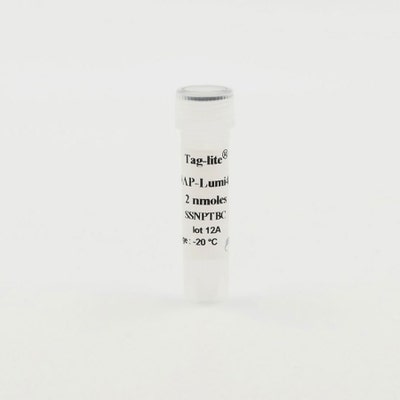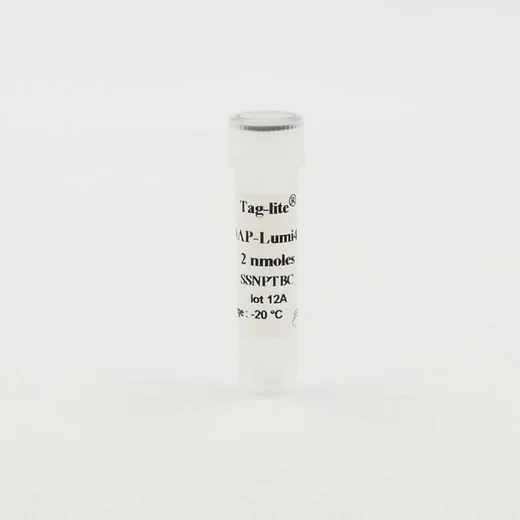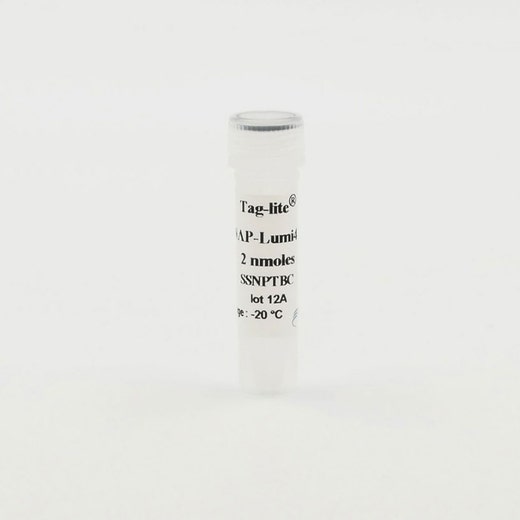

Tag-lite SNAP-Lumi4-Tb Labeling Reagents, 5 nmoles


Tag-lite SNAP-Lumi4-Tb Labeling Reagents, 5 nmoles






SNAP-Tag, Clip-Tag, and HALO-Tag are protein labeling systems enabling the covalent attachement of fluorophores onto proteins of interest. SNAP-Lumi4-Tb enables SNAP-tagged proteins to become labeled with a Terbium fluorophore.
| Feature | Specification |
|---|---|
| Application | Receptor-Ligand Binding |
SNAP-Tag, Clip-Tag, and HALO-Tag are protein labeling systems enabling the covalent attachement of fluorophores onto proteins of interest. SNAP-Lumi4-Tb enables SNAP-tagged proteins to become labeled with a Terbium fluorophore.



Tag-lite SNAP-Lumi4-Tb Labeling Reagents, 5 nmoles



Tag-lite SNAP-Lumi4-Tb Labeling Reagents, 5 nmoles



Product information
Overview
Over the past few years, SNAP-Tag, CLIP-Tag, and Halo-Tag technologies combined with TR-FRET have paved the road to the development of many non-radioactive, no-wash binding assays. The method is based on transfecting cells using plasmids encoding a SNAP-Tag (or CLIP-Tag, or Halot-Tag) and subsequently labeling them with acceptors or donors. SNAP-Lumi4-Tb allows the labeling of SNAP-Tagged proteins with a terbium fluorophore.
Specifications
| Application |
Receptor-Ligand Binding
|
|---|---|
| Brand |
Tag-lite
|
| Detection Modality |
HTRF
|
| Product Group |
Fluorescent Reagent
|
| Shipping Conditions |
Shipped in Dry Ice
|
| Target Class |
GPCR
|
| Technology |
TR-FRET
|
| Therapeutic Area |
Cardiovascular
Infectious Diseases
Metabolism/Diabetes
NASH/Fibrosis
Neuroscience
Oncology & Inflammation
Rare Diseases
|
| Unit Size |
5 nmol
|
Video gallery

Tag-lite SNAP-Lumi4-Tb Labeling Reagents, 5 nmoles

Tag-lite SNAP-Lumi4-Tb Labeling Reagents, 5 nmoles

Citations
How it works
Receptor labeling
SNAP-tag® is a small fusion tag that covalently interacts with specific substrates. SNAP-tag enables the specific and covalent labeling of any protein of interest. Cells are provided unlabeled and need to be labeled with Lumi4-Terbium prior to running a binding assay. Labeling reagents are available from the Revvity catalog in 4 different sizes. For more details refer to labeling procedure.

Resources
Are you looking for resources, click on the resource type to explore further.
G-protein coupled receptors (GPCRs) are crucial transmembrane proteins involved in cellular signal transduction.
This technical...
This guide provides you an overview of HTRF applications in several therapeutic areas.


How can we help you?
We are here to answer your questions.






























